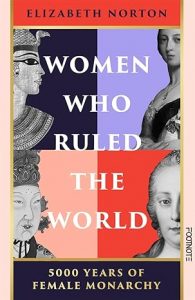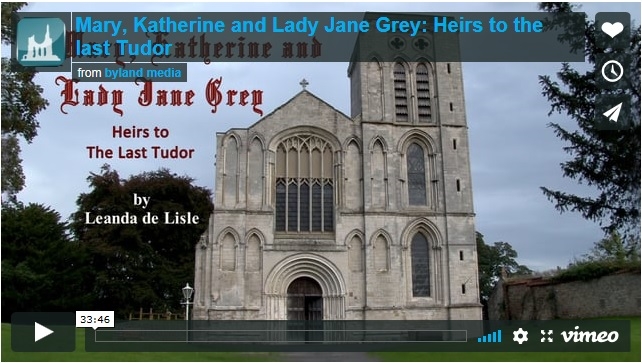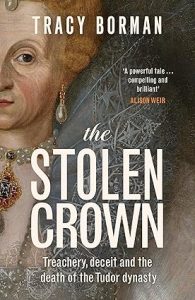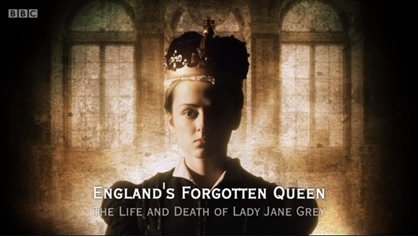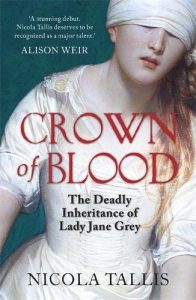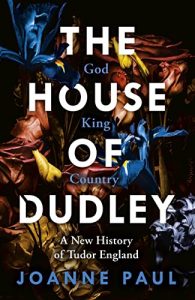On 12th February 1554, Lady Jane was executed at the Tower of London.
The story of her execution has featured in several historical novels.
In Innocent Traitor by Alison Weir, Jane waits for her execution.
‘It is now that I force myself to look across to the scaffold on Tower Green. It has been draped with black material and strewn with straw, but there is no sign of the block. As yet, the green is deserted. Sir John has told me that, as my execution is to be held in private, attendance is by invitation only, and that the numbers have been strictly limited. They are probably all at Tower Hill just now, watching Guildford being beheaded, I expect. And when that is over – which cannot be long now, I pray – it will be my turn. It is the waiting that is so hard…A crowd of people is advancing on Tower Green. There is little time left. I pick up my prayer book and try to concentrate on the passages I have marked for my final devotions. But as the words dance before my eyes, I hear footsteps on the stairs, and the door swings open.’
(c) Arrow, p.399-400
In Sisters of Treason by E.C Fremantle, Levina Teerlinc watches as Jane walks to the scaffold.
‘They appear then, Brydges first, ashen-faced, after him the Catholic man who was unable to convert her, both with their eyes cast down. And there she is, bold and straight, her psalter held open before her, lips moving in prayer, flanked by her two women who are barely holding back their tears. The scene engraves itself on Levina’s mind; the jet black of Jane’s dress against the drab stone of the Tower behind; the way the wind lifts the edges of everything, suggesting flight, the almost weeping ladies, their gowns lurid splashes of colour; the exact pallor of Brydges’s skin; the look of solemn serenity on Jane’s face. She is compelled to render this in paint.
…Jane Grey mounts the few steps and stands before the onlookers to speak. She is close enough that were Levina to reach up she could touch the edge of her skirts, but the wind takes the girl’s words and only snippets reach them. ‘I do wash my hands thereof in innocency…’ She makes the action, rubbing those small hands together. ‘I die a true Christian woman and that I do look to be saved by no other mean, but only by the mercy of God.’ She is cleaving to the new faith to the last and Levina wishes that she had a pinch of this girl’s unassailable fortitude.
When Jane is done she shrugs off her gown, handing it to her women, and unties her hood. As she pulls it away from her head her hair looses itself from it’s ribbons and flies up, beautifully, as if it will lift her to the heavens.’
(c) Penguin, p.6-7
In The Last Tudor by Philippa Gregory, the preparations for her execution are narrated by Jane.
‘I read the Miserere in English, for God can understand English and it is superstition to think that He has to be addressed in Latin. John Feckenham follows me, speaking the words in Latin, and I think how beautiful the language is, and how sweet it sounds today, chiming and interweaving with the English words in the damp misty air with the seagulls calling over the river. I remember that I am only sixteen and that I will never see the river again. I can’t believe that I will never see the hills of Bradgate again, or the paths where Katherine and I used to walk under the trees, or my old pony in the field, or the caged old bear in the pit. The prayer lasts an oddly long time, a timeless time, and I am surprised when it ends and I have to give my things: my gloves, and my handkerchief, my prayer book. The ladies have to prepare me for this, my final royal-appearance. They take off my hood, my black hood trimmed with jet, and my collar. Suddenly the time is racing past when there were things I wanted to say, that I wanted to make sure that I saw before this moment. I am sure there were last words that I should say, memories that I should recall. It is all happening too fast now.
I kneel. I can hear Brother Feckenham’s steady voice. They put on the blindfold before I have had my last glimpse of the seagulls. I meant to look at the clouds, I meant to be sure of my last glimpse of the sky. Suddenly I know fear and I am in the white blankness of daylight blindfolded.
‘What shall I do? Where is it?’ I scream in a panic, and then someone guides my hands to the block and its solid square roughness tells me that my destiny is inexorable. This is the material world indeed, this is the most material thing I will ever touch. I realise it is the last thing I will ever touch. I grip the block, I even feel the grain of the wood. I have to put my head down on it. I note that the blindfold is wet with my tears, soft and hot against my closed eyelids. I must be crying and crying. But at least no-one can see, and whatever happens next, I know that it is not death for I will never die.’
(c) Simon & Schuster UK, p.106-107.
p.105-107






